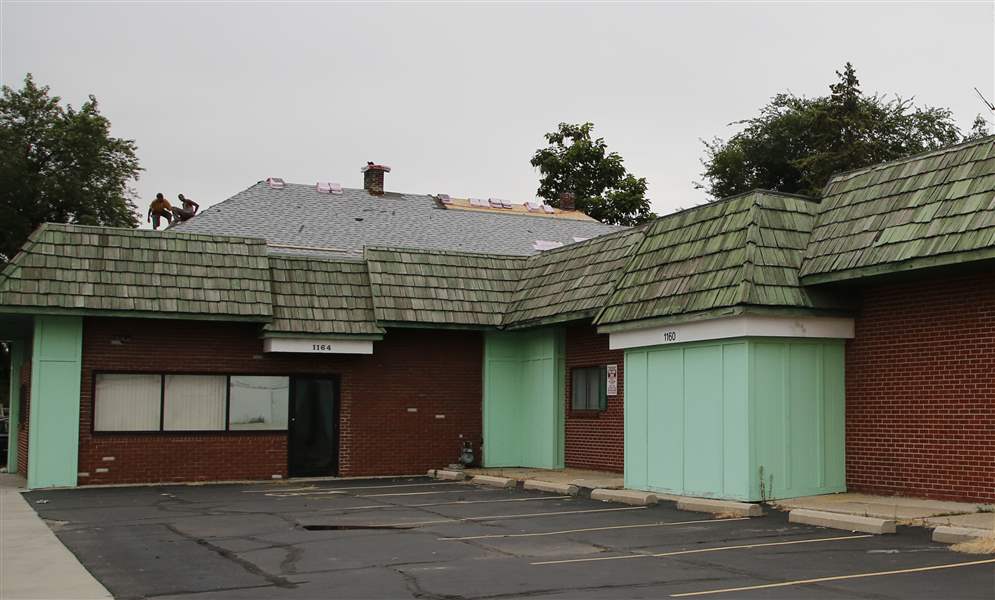
Abortion clinic to ask high court to reconsider decision to revoke license
2/15/2018
Capital Care Network in Toledo, northwest Ohio's last remaining abortion clinic, is expected to ask the Ohio Supreme Court to reconsider its decision last week upholding the state’s move to revoke its license.
THE BLADE
Buy This Image
COLUMBUS — Still awaiting word on its fate, northwest Ohio’s last abortion clinic is expected to ask the Ohio Supreme Court on Friday to reconsider its decision last week upholding the state’s move to revoke its license.
That would automatically stay the effects of the court’s 5-2 decision last week in the state’s favor and keep Toledo’s Capital Care Network open while the justices ponder the motion.

Capital Care Network in Toledo, northwest Ohio's last remaining abortion clinic, is expected to ask the Ohio Supreme Court to reconsider its decision last week upholding the state’s move to revoke its license.
This occurs as three other abortion clinics on Thursday sued in federal court to block implementation of a new Ohio law prohibiting an abortion when the patient believes the fetus may have Down syndrome.
During a news conference announcing the Down syndrome filing, participants talked of Capital Care as a victory in abortion rights because the clinic secured a signed patient emergency transfer agreement with ProMedica on Wednesday, the lack of which had motivated the state’s moves to shut it down.
RELATED CONTENT: ProMedica authorizes patient-transfer agreement with Capital Care ■ Ohio court rules against Toledo abortion clinic
The written agreement is in the hands of the Department of Health, but as of Thursday it had yet to accept it and either revoke its closure order or renew the clinic’s operating license. A decision could occur at any time.
The department did not respond to requests for information from The Blade.
The clinic had been without a mandatory written agreement for months after the University of Toledo Health Center, formerly the Medical College of Ohio, opted not to renew its pact. The clinic eventually reached an agreement with the University of Michigan Health System in Ann Arbor more than 50 miles away, but that agreement was rejected as not being with a “local” hospital.
“Closing Capital Care Network of Toledo will not end abortions,” state Rep. Teresa Fedor (D., Toledo) wrote in a letter sent Thursday to department Director Lance Himes.
“It will, however, impact and likely end safe and timely abortions in the area,” she wrote. “If the Department of Health truly wishes to put the health and well-being of Ohioans first, you must recognize the need for the safety, timely access, and treatment provided by Capital Care Network of Toledo.”

Ohio Gov. John Kasich signed House Bill 214, a new law prohibiting an abortion when a patient believes the fetus may have Down syndrome.
Eleven other Ohio House Democratic women signed the letter.
The Down syndrome lawsuit was filed in U.S. District Court in Cincinnati by clinics in Cleveland, Cincinnati, and Dayton, a doctor who performs abortions, and Planned Parenthood of Ohio.
“This new law criminalizes the performance of an abortion upon a woman if any part of her reason is an indication that the fetus has Down syndrome,” said Freda Levenson, legal director of the American Civil Liberties Union of Ohio.
“The criminal penalties are six to 18 months in prison, plus a fine, plus for a physician mandatory loss of their license to practice medicine,” she said.
Gov. John Kasich signed House Bill 214, sponsored by Reps. Sarah LaTourette (R., Chesterland) and Derek Merrin (R., Monclova Township), who characterized the measure as an anti-discrimination measure protecting those with Down syndrome.
“It is a shame that an organization that claims to be the very biggest and best at defending victims of discrimination completely disregards the most vulnerable members of our society who are being discriminated against,” said Mike Gonidakis, president of Ohio Right to Life.
“The ACLU is hurting Ohio by constantly suing to further an extremist agenda,” he said.
Among the defendants are the Department of Health, prosecutors in areas that might be asked to bring cases under the law, and Dr. Bruce R. Saferin, a Sylvania Township podiatrist who was recently reappointed to the State Medical Board that considers disciplinary action against doctors.
Nora Chestnut, 6, of Milford, has Down syndrome. Her mother, Emily, learned of the chromosomal defect upon Nora’s birth. Her twin sister does not have the defect.
Although Emily Chestnut said an earlier diagnosis would have made no difference in her decision to proceed with the pregnancy, she bristles at the contention of the law’s supporters that they passed it to protect people like Nora.
“When they signed this bill, Governor Kasich and state legislators used my child as a political tool to promote their own agenda,” she said. “They don’t care about Nora. If they did, they would be using their valuable time to ensure that every child born with Down syndrome has what they need to live a healthy full life.”
The lawsuit charges that the law unconstitutionally infringes on a woman’s right to access an abortion. It seeks a temporary restraining order to prevent the bill from taking effect as scheduled on March 22.
Contact Jim Provance at jprovance@theblade.com or 614-221-0496.